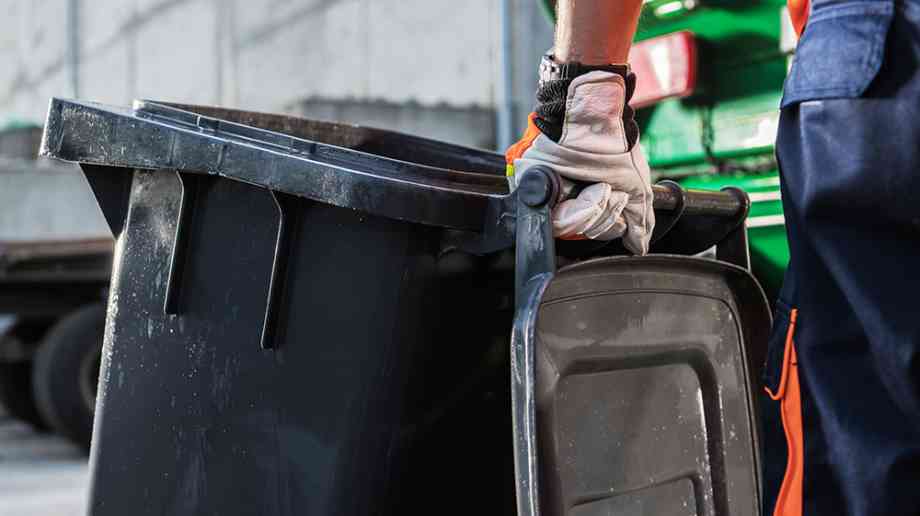Crowdguard will be exhibiting at Stand C50 at the International Security Expo 2025 from 30th September – 1st October, showcasing practical Hostile Vehicle Mitigation (HVM) solutions that protect people and places without disrupting how spaces are used.

Making collections more efficient
All local authorities are struggling with rising costs at the moment and savings need to be found. On top of this, many people still do not recycle as much as they could. With recent bad weather also affecting bin collections, is there a way to make bin collections more efficient?
Councils across the country have been introducing different initiatives in order to make their bin collections more efficient and increase rates of recycling. Ideas range from reducing collections to encouraging residents to separate their waste better.
Pleas to residents
Without meaning to attribute blame, there is more that residents could do to increase rates of recycling and make bin collections quicker for the pick up teams.
Residents in Flintshire, Wales are being encouraged to recycle more. The Welsh Government has a target of 70 per cent recycling, however Flintshire is currently at 60 per cent and the council faces the possibility of a £670,000 fine from the Welsh government for missing targets last year. Residents are being warned that waste collections may be cut to three-weekly collections if recycling rates are not improved. The council will be publishing tonnage amounts of recycling and waste monthly to show how well residents are doing.
Katie Wilby, chief officer for the streetscene department, said: “There has to be a significant improvement to recycling figures otherwise we will have no option but to restrict the amount of residual waste collected at the kerbside.
“It is very much down to the residents of Flintshire to recycle as much as possible and achieve those targets.”
Flintshire Council also took part in Food Action Waste Week from 6 to 12 March, where local residents were encouraged to minimise the amount of food wasted with help on planning and managing the amount of food that is bought and eaten. The council is encouraging residents to donate unused food to local food banks or community fridges so that others can make use of it. The council states that in the year to March 2022, almost 4,700 tonnes of food waste was recycled in Flintshire. However, even more than this ended up in black bins, which the council points out is not sustainable.
The slogan for Love Food Hate Waste’s Food Waste Action Week campaign this year was “Win. Don’t Bin.” And the campaign aimed to bring the nation together to save time and money by making food go further.
Flintshire’s cabinet member for streetscene and transportation, Councillor Dave Hughes, said: “It’s great that we are recycling food waste, but we know that there is still a lot of food waste being placed in the black bin. Around one quarter of the waste put in the black bin is food which could still be eaten or be sent for recycling.
“Given the environmental impact that growing, manufacturing, transporting and disposing of food can have on the environment, we need take action and there is no better time to start taking action than right now.”
Residents in Torfaen are also being encouraged to recycle more with the threat of reduced waste collections. Wheelie bins are currently collected every two weeks, though the council said that these are being found to contain food waste, for which there is separate caddy which is collected weekly. Paper and card are also said to account for up to 15 per cent of black bin waste, though this can also be recycled. A consultation is set to be held on the plans, which are intended to boost recycling rates.
The Local Democracy Reporting Service found that the amount of waste collected across Torfaen which is destined for landfill has increased since the pandemic. In 2019, Torfaen hit a 64 per cent rate of recycling. However, over the following two years, the rate fell to 62 per cent.
The Welsh Government can fine councils £100,000 for every percentage point they are short of the 70 per cent target rate for recycling. The Welsh Government has demanded an explanation for the failure to hit target in 2021/22 with the cleaner communities scrutiny committee asking the council to produce clear information for residents to explain the reasons for any changes.
Any changes would be brought in from March 2024.
Help the crews
Residents of Epping Forest have been asked to do what they can to help increase the speed and efficiency of bin collections in the area, with crews collecting around 1,700 bins in a single round. Residents have been asked to position waste as close to the road as is safely possible with bin handles pointed in the direction of the road, as “The further the crews walk, the longer it takes to collect your waste.” It is anticipated that careful placement of bins could save collections crews an hour or more.
Locals are also being encouraged to consider the welfare of the collections teams, as “Time off work leads to delayed and missed collections.” Residents are reminded to not bury heavy waste at the bottom of the bin and not to stack bags of rubbish high.
Cardboard should be flattened and bagged to keep it clean and dry for collection.
Recycling waste in the area is collected in transparent plastic bags, which attracts animals. Locals are urged clean residual food off packaging so vermin is not attracted. Vermin can also carry disease which may then be passed on to collection teams. For example, Weil’s disease, also known as Leptospirosis, is common in rats and can be caught by anyone who comes into contact with rat urine.
Parking is a big hindrance to a speedy collection. Residents are reminded to leave enough room for refuse lorries to travel down the road. Following on from this, drivers are urged to be patient and courteous to refuse crews.
Reduced Collections
Many other councils are reducing the frequency of bin collections in a bid to encourage residents to recycle more. Residents in Wokingham could see their bin collections reduced from weekly to fortnightly. Proposals have been put forward by the council after more than a year of research, analysis and public consultation. Currently both recycling and general waste are collected weekly, but proposals are being considered where they are each collected on alternate weeks. Food waste will still be collected weekly.
Another proposal has also been put forward which will see the current plastic bags replaced with wheelie bins. Waste collected in plastic bags has a tendency to be dispersed across streets during bad weather and is also a target for foxes and rats.
Cllr Ian Shenton, executive member for environment, sport and leisure, said: “By having weekly collections, we recycle nine to 14 per cent less than local authorities that collect rubbish fortnightly or three-weekly. We need to improve our recycling performance, the government has a new recycling target for local authorities and we just aren’t doing enough now.
“We have also set ourselves a goal in our climate emergency action plan of reaching a recycling rate of 70 per cent, and we’re not going to get there without making some changes.”
“Experience of other councils tells us that alternate weekly collections will not discourage recycling. On the contrary, it encourages residents to put recyclable waste back to recycling, instead of binning it. We expect, as a result of the changes, our recycling rate will go up to 64 per cent from our current rate of 54 per cent, and carbon emissions will be reduced by 2,400 tonnes per year.”
The changes would be introduced in Summer 2024 and are expected to save more than £1 million a year by 2025/26.
Cllr Clive Jones, leader of the council, said: “Inadequate government funding and increasing costs have left us with no choice but to change our waste services, so that we can protect vital services and help our residents during this tough time.
“If introduced in the next financial year, the changes would save us around £500,000 to start with and at least £1 million in the year after. This is the best way to make savings before the current waste service contract expires in 2026.
New systems
Denbighshire Council has announced plans to move waste collections to once every four weeks, with recycling being collected once a week. The plans will also see the introduction of new larger bins to account for the longer waiting times. The 140-litre refuse bins that are already in use would be replaced with 240-litre bins. The old bins would then be sold or recycled.
There will also be a new method of separating recycling into different boxes for different materials. There would be new boxes for the separation of plastic, paper, cans and glass, which would be collected weekly. Food waste would also be collected weekly. On top of this, from September, a new nappy and incontinence pad collection trial will begin.
The council has said that 5,000 tonnes of recyclable material is still being thrown away and this amounts to a cost of £500,000 which could be spent elsewhere on other council services.
An online survey is available for residents to complete, to help the council understand current recycling patterns, as well as help people to prepare for the changes. The changes are set to be introduced in March 2024, so residents have lots of time to adjust their own waste management and prepare for the changes.
Seasonal collections
Leeds City Council provides a brown bin service for garden waste, however, it is not collected all year round. This year, the fortnightly service will run from March to December. According to Leeds City Council, the council provides the largest garden waste collection service by any council in the UK and is one of only a handful that do so for free. Last year, 29,662 tonnes of garden waste was emptied from the 217,000 brown bins in the city. The waste collected from the brown bins is composted locally and used in farming, horticulture and land restoration projects around the city. Residents are also encouraged to use other methods to reduce their garden waste including leaving grass cuttings on the lawn, reusing garden waste by composting or creating piles for insects, birds and other local wildlife. The council also has a partnership with Great Green Systems, which provides a 40 per cent discount on composters to local residents.
Councillor Mohammed Rafique, Leeds City Council’s executive member for environment and housing, said: “The resumption of the free brown bin collection service is welcome news, marking the return of spring to Leeds.
“With over 18,000 brown bins emptied and taken for composting every day across Leeds, we are proud to offer the largest, free garden waste collection service of any council in the UK to help residents manage their gardens.
“However, we cannot offer this collection service to every household and regardless of whether you have a brown bin or not, the most environmentally friendly way to manage garden waste is by home-composting as much as you can; creating soil nutrients and improving the biodiversity of your garden and neighbourhood.
“There is plenty of on-line advice on how easy this is to do, and I am pleased that we have been able to secure a big discount on compost bins for Leeds residents.”
Mansfield District Council also has a seasonal brown bin collection service, though this is paid-for by those who use it for a fee of £30 a year if you pay before 30 April and £32 for those paying after this date. Those with more garden waste to dispose of can purchase up to three additional bins for £18 a year. Both 240 and 120 litre sizes are available. Across the district, around 19,000 brown bins are collected fortnightly from March to November and then once in December.
Councillor Andy Burgin, portfolio holder for the environment, said: “Our garden waste service brings convenience right to your door, so we are now reminding all residents that signups for 2023 are open.
“Gardening is a great way to wind down from the stresses and strains of life for many and is an easy way to keep active and moving. The bonus part is that with your brown bin, you don’t need to worry about trips to the local tip to tidy up afterwards.
“We would encourage residents to mark their brown bin clearly with their house number so that our crews can identify which need emptying by using our new in-cab technology, linked to the payment system.”
Bedford Borough Council’s green-lidded garden waste bin also resumed in March.
Councillor Charles Royden, portfolio holder for environment, said, “We are proud that unlike many councils we continue to provide garden waste collections without making additional annual charges to residents. From the start of March to the end of November 2022 we collected 10,125 tonnes of garden waste that was composted at a local site in Ravensden.
“I encourage residents to also consider composting what they can and it’s fantastic that the council can provide compost bins at a subsidised price for households.”
Change of provider
It is worth investigating if a change of service provider could reduce costs and/or increase efficiency. Southend-on-Sea City Council has recently signed a new contract with Suez recycling and recovery UK for the treatment of residual and bulky waste. Under the contract, which will run for five years, Suez will handle all the residual and bulky waste collected from more than 78,000 households in the city, as well as from two council-operated Household Waste and Recycling Centres.
Suez will also manage any waste that is collected from fly tipping or through street and beach cleaning. It is estimated this will save around 44,300 tonnes per year.
Following the closure of Tovi Eco Park, a lot of waste from the city was sent to landfill and the council says that the new contract is a big cost saving. It is anticipated that the new contract will save around £2 million over its lifetime.
Non-recyclable waste which is sent to the Suez plant in Suffolk will be turned into energy.
Cllr Paul Collins, cabinet member for asset management and inward investment, said: “Energy from waste is a much more environmental and efficient alternative to landfill, which produces energy for the national grid, and the on-site recycling facility uses the leftover ash to make secondary aggregate products for road building and construction.
“Along with this, the new contract provides a big cost saving too, which is vital as we grapple with our own financial challenge and support our communities with the cost-of-living crisis.
“Council officers will now work closely with Suez over the next few months to ensure a smooth transition. This change in the end destination of our waste will not affect residents’ collections, and residents should put out their pink recycling sacks, paper and cardboard box, food waste bin and black sacks on their usual collection day.”
Amanda Padfield, director of public sector development for SUEZ recycling and recovery UK said: “We look forward to partnering with Southend-on-Sea city council over the next five years, using our regional network to help divert more waste away from landfill in the East-of-England.
“By sending the residual waste to the Suffolk Energy from Waste facility, this new contract will also bring further efficiencies for the plant and for our other local authority partner in the region, Suffolk County Council.”
According to Suez, accepting waste from Southend as well will make the best use of the plant’s capacity.
Staff safety and wellbeing
It is important to consider the health and wellbeing of staff. Reduced sickness means more staff available to collect waste. Over the summer, bin collections in Basingstoke and Deane will take place earlier in the morning, to protect staff from high temperatures. Between 1 May and 31 August, residents are asked to put their bins out by 6am, so that collection teams can start work earlier in the day and avoid the hot weather. Basingstoke and Deane Borough Council’s cabinet member for resident services Cllr Rebecca Bean said: “Collecting bins is a physically demanding role in any weather but during extreme heat it is important we consider the crew’s safety while also doing our best to avoid disruptions to bin collections.
“Last year, in agreement with our waste collection contractor Serco, we introduced 6am collections during shorter predicted periods of extreme heat. But to avoid regularly changing times in response to changing weather we have decided to introduce a set 6am start time from 1 May to 31 August.
“This move supports the effective delivery of the waste collection service, the safety of the bin crews and is easier for our residents to remember. I’d like to thank residents for their support in advance of this slight change and encourage them to share the information with neighbours that bins must be at the kerbside ready for collection by 6am from 1 May to 31 August.”
There are many ways local councils can improve the efficiency of their refuse collection, improve services for residents, increase recycling, cut down on waste and save money. This could be done by cutting down on collections, or finding a new contract that provides better value for money. Though staff shortage, sickness and burnout are a problem, looking after the crews that collect rubbish will lead to more staff at work, and healthier and more energised staff, which in turn leads to more waste collection. Reduced collections are an obvious way to cut costs, as theoretically, reducing collections leads to money saved. Changing collections to fortnightly from weekly could make a big difference to the purse strings, with little impact to residents. The same could be said of seasonal collections – it is unlikely that people are producing much garden waste in December, January and February. Consider charging for garden waste collection – for homeowners with large gardens that produce more waste, it can be argued that if they can afford a house with a large garden, they can afford a small contribution a year for their garden waste to be collected.
It seems the best way to improve collection efficiency and cost is to encourage behavioural changes in residents. Consider an information campaign highlighting the amount of recyclable waste that isn’t being disposed of correctly, and how this is having an environmental and financial cost for the area. Work with local businesses and even schools to raise awareness. Finally, as Epping Forest District Council did, share tips with locals on how they can help improve bin services. With everyone on board, you should see change.
Event Diary
An essential date in the calendar for those responsible for homeland and global security; International Security Expo returns to Olympia in London on 30 September & 1 October 2025.
Every sport, from grassroots football to world-class tournaments, depends on one constant: high-quality playing surfaces and well-maintained green spaces.
Tickets: Free registration available at www.retailscl.com
The Retail Supply Chain & Logistics Expo is the UK’s leading event for retail supply chain and logistics professionals, showcasing the latest innovations in fulfilment, 3PL, AI-driven automation, and warehouse technology.
Supplier Profiles
Bauder Accepts Keys to its New UK Distribution Centre at Gateway 14
Bauder marked a major milestone in its UK expansion with the official handover of a brand
Words of World: Bridging language barriers with excellence
At Words of World, we specialise in professional translation and interpreting, d
Latest Features
The British Institute of Cleaning Science (BICSc) and the Cleaning & Support Services Association (CSSA) have successfully completed a groundbreaking project aimed at exploring the future of cleaning. This collaboration marks a significant milestone in the cleaning industry, reflecting a shared commitment to embracing innovation with confidence.
The Crown Commercial Service’s (CCS) new framework on Language Services (RM6302), dealing with translation, transcription and interpreting, is live, running from 7th May 2025 to 6th May 2028.










